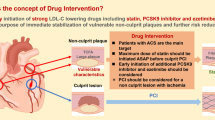Background:
The diagnostic accuracy of the physical and pharmacological stress echocardiography tests is higher than routine exercise electrocardiography. They have an acceptable safety profile and have been rarely associated with severe adverse effects.
Case Report: We present a case of acute anterior myocardial reinfarction immediately after exercise and pharmacological (dipyridamole-atropine) stress echocardiography testing 1 month after successful stent implantation in LAD. Our patient was a 43-year-old man with a history of heavy smoking and hypertension. Remarkably, the stress echocardiogram was non-diagnostic few hours before the infarction occurred. Angiography performed 4 months after the reinfarction revealed neither a culprit lesion nor stent thrombosis.
Conclusion: Aggressive “last generation” pharmacological stress testing may provide optimal diagnostic accuracy, but as in our case, complications may occur, even after negative stress testing. To our knowledge, this is the first reported case of an acute myocardial infarction as a severe complication of stress testing, which developed in a patient after stent implantation.
Hintergrund:
Die diagnostische Wertigkeit der Belastungs- und pharmakologischen Stressechokardiographie ist besser als ein Routine-Belastungs-EKG. Die Stressechokardiographie hat eine niedrige Komplikationsrate und selten Nebenwirkungen.
Kasuistik: Wir berichten über einen Patienten mit akutem Vorderwandreinfarkt am selben Tag nach einer für eine Ischämie negativen Stressechokardiographie (kombinierte Belastungs- und Dipyridamol-Atropin-Stressechokardiographie), 1 Monat nach der erfolgreichen Stentimplantation im RIVA. Der Patient war 43 Jahre alt, starker Raucher und eingestellter Hypertoniker. Bei der Herzkatheteruntersuchung 4 Monate nach der Reinfarzierung konnte ein offenes Koronargefäß ohne relevante Stenose oder Stentthrombose nachgewiesen werden.
Schlussfolgerung: Der aggressive, kombinierte, pharmakologische Stresstest hat eine optimale diagnostische Wertigkeit für die Diagnose der koronaren Herzkrankheit. Er kann aber auch nach unauffälligem Testergebnis Komplikationen verursachen, wie in diesem Fall gezeigt werden konnte. Unseres Wissens ist das der erste beschriebene Fall eines Myokardinfarkts nach Stressechokardiographie bei Zustand nach erfolgreicher Stentimplantation.
Similar content being viewed by others
Author information
Authors and Affiliations
Additional information
Received: April 14, 2001; revision accepted: May 19, 2001
Rights and permissions
About this article
Cite this article
Nedeljkovic, M., Ostojic, M., Beleslin, B. et al. Dipyridamole-Atropine-Induced Myocardial Infarction in a Patient with Patent Epicardial Coronary Arteries. Herz 26, 485–488 (2001). https://doi.org/10.1007/PL00002053
Issue Date:
DOI: https://doi.org/10.1007/PL00002053




